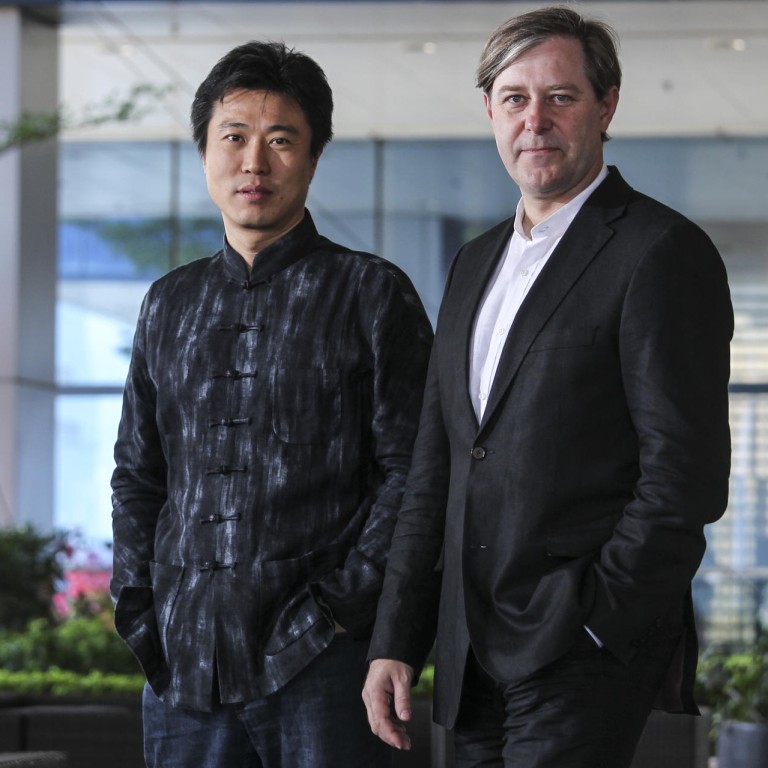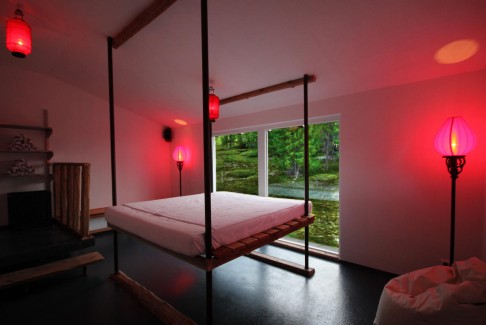
China hoteliers launch luxury resorts where the stay's about the experience
A joint venture is creating a new brand of eco-friendly luxury resorts to cater for a different breed of Chinese traveller
They are an odd couple. One is an outgoing, international services consultant who opened a boutique luxury lodge in his native Austria; the other is a media-shy IT geek from China who went on to set up one of the country's biggest budget hotel chains. Now the two men are joining forces to create a line of "experiential" hotels for the well-heeled, starting in Shanghai.
Conceived as an eco-friendly, off-the-grid resort, the first project is located on Hengsha Island in the mouth of the Yangtze River, where the attractions will be landscaped gardens, home-grown organic produce and leisure activities such as archery and painting rather than casinos and designer shops.
The venture is the brainchild of Alex Zheng Nanyan, co-chairman of the Plateno Hotel Group. A softly spoken 47-year-old, Zheng began his career in software development but immersed himself in the hospitality business in 2000 after joining Ctrip, the successful online travel agency. The job gave him an insight into the enormous growth potential of China's tourism business and he left to tap into the boom with the 7 Days Inn budget chain, which opened in 2005.

Two years ago, Zheng's scope extended to mid-range hotels when he and his 7 Days partners formed Plateno with two private venture funds (the group now operates the largest hospitality loyalty programme in China, with more than 80 million members who travel internationally as well as domestically).
But the group is also keen to capture a slice of the high-end market, and it has led Zheng to look at places that provide that "new luxury" of experiences for a different breed of Chinese traveller.
"The first generation of tourists just wanted to get out and see the world," he says. "The second focused more on big cities and shopping; the third is looking more for experiences, they have been abroad and also have more time to travel, usually about two weeks."
Zheng's quest to cater to this more discerning clientele led him to Walter Junger and H12, a 12-room art and lifestyle alpine lodge that the latter created in Carinthia, on the Austrian border with Italy and Slovenia.
Junger, a former regional director for Ritz-Carlton in Europe and South America, had turned a rundown house in the Alps into an inviting and distinctive haven. Influenced by his time in Asia, including a stint in Hong Kong, he commissioned 12 artists of different nationalities to each decorate a room based on the animal signs of the Chinese zodiac.
An innovative marketer, he also persuaded a dozen Austrian athletes who had taken part in the Winter Olympics to pose in the buff in the hotel restaurant to publicise the dining space.
Trip Advisor ranks H12 as one of the top 10 hotels in Austria and it has earned rave reviews for its attentive but unobtrusive service, spectacular views and thoughtful interiors.
Impressed by his track record and the response from guests, Zheng connected with Junger and set up a joint venture to create a line of H12 hotels not only in China, but also Europe and Africa.
Some luxury hotels have made successful forays into the experiential market on the mainland. There's Naked Retreats in Moganshan, a mountainous area of bamboo forests and tea plantations near Hangzhou. Hyatt Regency operates a resort next to wetlands and eco-villages on Chongming Island, not far from Hengsha.
However, H12 aims to go further in the experiential realm. The debut project in Hengsha is a one-hour drive from downtown Shanghai, followed by a short ferry ride to the island, just southeast of Chongming.
Despite its proximity to the bustling metropolis, the hotel promises tranquillity when it is completed in about two years' time.
"There is no bridge, so there are no cars on the island," Junger says. "There are only manicured gardens, waterways and organic farming. I have never seen anything close to it [around the city] and I have lived in Shanghai twice."
The site covers 66 hectares and the group plans to build the world's first off-the-grid hotel, powered by wind and solar energy.
That sounds ambitious, but Junger is confident they can make it happen. After all, one of their investors, Shunfeng International Clean Energy, specialises in the field.
Guests will dine on organic vegetables grown in the area and fresh honey from local beehives.
The third generation of Chinese tourist is looking more for experiences, they have been abroad and also have more time to travel
Continuing the artistic theme, the hotel will convert five military bunkers into artist studios where guests can paint, sing karaoke or play mahjong without disturbing others.
"We will have rowboats and bicycles, archery and 15 houses set in a bamboo forest overlooking the lake on Hengsha," Junger adds. "We are defining new luxury."
Neither he nor Zheng view luxury in terms of marble floors, crystal chandeliers and gold-plated taps.
"We are aiming for 'art of life': we want to create boutique art and lifestyle hotels that provide a certain service level," he says - and at rates even higher than some five-star hotels.
"H" stands for "home" the 50-year-old hotelier explains, but that's not to say H12 hotels will resemble any guest's home.

"It's 'home' in the sense that it is our brand of hospitality. Next time you come back as a friend. We will greet you at the driveway with a big hug, and we are not necessarily providing three Michelin star [food]. There will be no check-in desk - you go into the restaurant, drink champagne or coffee as you check-in. It's a new but relaxed and efficient way of doing things."
The birth of an international H12 brand is a matter of the right timing, he adds.
When he set up his consultancy, Walter Junger & Friends, 10 years ago, it was mainly to design lifestyle concepts for hotels and restaurant owners who were not experts in the industry but nevertheless wanted to create "something authentic and unique".
At the time, China was not ready for their ideas about combining art and lifestyle in the hotel environment. "But now it is," says Junger.
"The China travel explosion has happened in the past two or three years and no one understands the direction it will take in Europe and elsewhere. I've been in Asia for 25 years and I've been in Europe the rest of my life, so I think I have a good understanding of both worlds and that's the future."
The Hengsha project is not only aimed at domestic travellers keen for a quick getaway from the stresses of city life, but also companies looking for interesting venues for meetings and adventurous international travellers seeking a sophisticated countryside experience just outside of Shanghai.
Even so, with more than 100 million Chinese tourists who have greater disposable incomes, a bigger slice of the domestic pie will mean rich pickings.

President Xi Jinping's ongoing crackdown on lavish spending has hit many luxury businesses, but Zheng argues it will not effect Plateno. The new hotel line will not depend on the patronage of government officials, but will tap into a natural evolution of the Chinese tourist, he says.
In China, the perception of luxury hotels usually involves ostentation, "but our customers shy away from that - they are well-educated, progressively climbing up the career ladder and looking for a cultural, artistic lifestyle, not a materialistic one", Zheng adds.
He and Junger will soon head to Africa to scout for potential locations in addition to promising spots in Southeast Asia such as Thailand. But with the H12 headquarters based in Hong Kong, they are also keen to open a hotel in the city, too.
"I would love to have the first real resort hotel in Hong Kong," Junger says.
There are some small boutique properties around the city, but none in seaside communities such as Shek O.
"I was in Shek O recently eating at a restaurant and thought I was in Bali or Saint-Tropez," Junger says. "Why not put a luxury lifestyle hotel in a place like that? Tourists usually don't stay longer than one or two days in Hong Kong, but if you have a place like this then they would stay longer."

